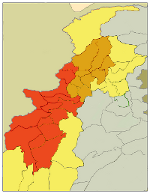Another senior Afghan Taliban leader detained in Pakistan
Pakistani security forces detained another senior Afghan Taliban leader in a raid in the northwest. Maulvi Abdul Kabir, the Taliban's former shadow governor of the eastern Afghan province of Nangarhar who led the group's council in the city of Peshawar, was arrested in the district of Nowshera in Pakistan's insurgency-wracked Northwest Frontier Province.
The arrest of Kabir was first reported on Feb. 20 at the Afghan news site Tol Afghan, and was confirmed by Fox News today.
As leader of the Peshawar Shura, Kabir served as a liaison between the Afghan Taliban and al Qaeda, Hezb-i-Islami Gulbuddin (Gulbuddin Hekmatyar's faction of Hezb-i-Islami), and the Movement of the Taliban in Pakistan, US intelligence officials told The Long War Journal. Pakistan’s Northwest Frontier Province and the adjoining tribal areas serve as a safe haven for these groups.
In addition to serving as a the leader of the Peshawar Shura and the former governor of Nangarhar, Kabir also was a close aide of Mullah Abdul Ghani Baradar, the Afghan Taliban's second in command and the group's operational commander, who was detained in Karachi several weeks ago. Kabir is said to be a potential successor to Baradar. Kabir was detained based on information provided by Baradar, Fox News reported.
Kabir is thought to be a member of the Zadran tribe, the same tribe to which Jalaluddin and Siraj Haqqani belong. The Haqqanis are based in North Waziristan in Pakistan and also in the Afghan provinces of Paktika, Paktia, and Khost. Siraj, the military commander and successor to his ailing father Jalaluddin, is one of the US' most wanted Taliban leaders in Afghanistan. On Feb. 18, the US killed one of Siraj's brothers, Mohammed, in an airstrike in North Waziristan that was targeting Siraj.
The arrest of Kabir is the fourth major blow suffered by the Afghan Taliban's top leadership over the past several weeks. In addition to Kabir and Baradar, Pakistan’s Inter-Services Intelligence agency, aided by the CIA, has also detained Mullah Abdul Salam, the shadow governor of Kunduz, and Mullah Mir Mohammed, the shadow governor of Baghlan province.
Pakistan’s motivations are unclear
The recent arrests by Pakistan of the senior Afghan Taliban leaders have sparked a debate over the country's intentions. Some analysts believe that the Pakistani military has reversed its years of support for the Afghan Taliban and now recognizes the threat the group represents to the Pakistani state. Pakistan’s Inter-Services Intelligence agency has secretly supported the Afghan Taliban for years, and has provided shelter to the group’s top leaders and operatives. The Taliban’s top council is widely known as the Quetta Shura as it has been based in the Pakistani city of the same name.
Other analysts hold that Pakistan is seeking to control negotiations between the Afghan government and the Taliban. The Baradar faction is said to seek negotiations with the Afghan government. The detained Taliban commanders, Kabir, Salam, and Mir Mohammed, are all close to Baradar.
These analysts are split on this point: some think that Pakistan seeks to use Baradar and his allies to direct negotiations. Other analysts surmise that Pakistan is seeking to sabotage negotiations by removing the Baradar camp and leaving the hard core Taliban intact.
A third group of analysts views the detention of these Taliban leaders as an effort to appease the US and other Western countries, which have pressured Pakistan to end its support for the Afghan group. The Pakistani government has in the past arrested several high profile leaders, such as former Taliban Defense Minister Mullah Obaidullah Akhund and former southern military commander Mullah Mansour Dadullah, after a period of intense US pressure to get Pakistan to rein in the Taliban. But these detentions have done little to derail the Taliban’s resurgence in Afghanistan. Also, the status of Obaidullah and Mansour is unclear; they are reported to have been released in prisoner exchanges with the Pakistani Taliban.
The Pakistanis also could be attempting to appease the US while also sabotaging negotiations.


